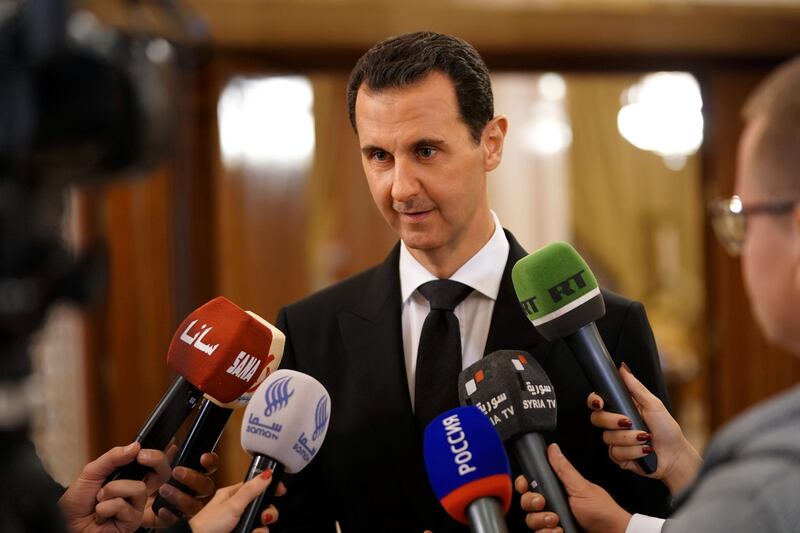In early December, Vladimir Putin visited the Russian Hmeimim airbase in Syria, accompanied by Bashar Al Assad. In a meeting with Syrian officers, he singled out Gen Suheil Al Hassan, the head of the Tiger Force in the Syrian army, as an effective military commander.
Mr Putin implied that the Russians were watching Gen Al Hassan closely, suggesting to a paranoid Mr Al Assad that he could emerge as a favourite of Moscow if the Syrian president were forced out of office. All of this was implicit, nothing more, but the look of dread on Gen Al Hassan's face showed he regarded the praise as a mixed blessing, as it could push the Al Assads to get rid of him.
Mr Putin has indicated that the war in Syria is effectively over. The Russian president is not alone in being optimistic. French president Emmanuel Macron told the France 2 television station on Sunday that the conflict against ISIL would be completed by February, "therefore it will be necessary to talk to Bashar and his representatives."
Yet as the director of the Carnegie Moscow Centre, Dimitri Trenin, recently remarked on a visit to Beirut, the hard part now begins. During the military campaign, he observed, Russia was the dominant outside player. However, now that the situation is moving towards a political settlement and reconstruction, many more parties will have a say in what happens in Syria, so that Moscow will need to share responsibility with others. “Russian diplomacy will come to the forefront,” he predicted, “and that will be challenging.”
Indeed, one thing that is immediately apparent is that for as long as Mr Al Assad remains president, he will represent a major barrier to Syria's normalisation. But if Mr Putin's priority is to consolidate Russian gains in a Syria that has been normalised, that means finding a solution to the Syrian president's future. Mr Al Assad is surely aware of this, which is why he has said time and again that any political process must be decided by the Syrians themselves, not outsiders.
What exists today is a particularly complex standoff, where Mr Al Assad, the Russians, and Iran are all facing each other in Syria, each wary of the intentions of the others. Mr Al Assad is said to be worried about Iran’s influence, hoping to counterbalance this by relying on Russia. But he also knows that the Russians may be willing to remove him from power and he can only neutralise such an effort by leaning more on Tehran, which wants him to stay on, so extensive is their sway in Damascus today.
The Russians and Iranians are also eyeing each other with suspicion. Which of them will emerge the more influential? Mr Putin is not keen to see Syria turned into a front line in Iran's confrontation with Israel, and has taken steps with the Americans to prevent the deployment of Iranian and pro-Iran forces near the occupied Golan Heights. Iran, in turn, mistrusts Russia's intentions with regard to Mr Al Assad, and doubtless feels that Mr Putin is too willing to compromise with the United States and Arab states in Syria than is good for its own interests.
What happens to Mr Al Assad is the elephant in the room of the whole Syrian endgame. For a long time the Syrian leader’s weakness was, paradoxically, his strength. So weak was he, that his downfall threatened the entire edifice that Russia and Iran sought to maintain in place in Syria. But now that this has become unlikely, Mr Al Assad’s removal risks causing less damage to the Syrian military-security power structure, making him more vulnerable.
Moscow and Tehran are said to disagree over what to do with him. However, at some point Syria will need funding for reconstruction, and little is expected to come from an Arab world deeply hostile to Mr Al Assad's remaining in place. The many tens of billions of dollars needed to rebuild a devastated country have to come from somewhere, and neither Russia nor Iran can finance reconstruction on their own. Moreover, the Syrian president's continued rule will be a barrier to the return of refugees, encouraging them to remain in countries bordering Syria.
If Mr Al Assad is the only obstacle preventing all this, even his closest allies may be tempted to begin recalculating the relative costs and benefits of keeping him in office. Iran is no less interested than Russia in strengthening peace in post-war Syria, even if the two vary widely on the conditions in which this takes place. And Mr Al Assad has too much blood on his hands to simply ignore the implications.
Doubtless Mr Al Hassan realised this. The Al Assads have been suspected of eliminating quite a few individuals perceived as potential alternatives to their rule. The end of Syria’s war may begin a game of political or physical elimination that raises many new questions about the country’s uncertain prospects.





